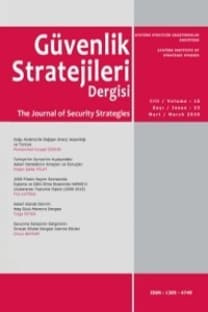Kitle Kaynak Yönteminin İstihbarat Üretimindeki Yeri: Ushahidi Platformu Örneği
Bu çalışmanın ana amacı kitle kaynak yönteminin istihbarat üretimine getirdiği yeni bakış açıları ve uygulama alanlarının tespit edilmesidir. Bunun için nitel araştırma yöntemi kullanılmış, kitle kaynağın kavramsal altyapısının ve uygulama alanlarının istihbarat üretimine ve organizasyonel yapısına yeni perspektifler getirip getirmediği sorusu üzerinde durulmuştur. Çalışma bu minvalde iki bölüme ayrılmıştır. İlk bölümde kitle kaynak kavramı irdelenmiştir. Bunun için çalışmanın teorik çerçevesini de oluşturan kitlelerin bilgeliği fikri, kitlenin teknoloji ile etkileşimi ve yeni sosyal sınıflar haline gelen Pro-Amatların ve üreketicilerin ortaya çıkışı işlenmiştir. İkinci bölümünde ise bir haber üretim platformu olan Ushahidi tanımlanmış, 2010’daki Haiti depremi sonrası kullanımı ve ürettiği istihbaratın mahiyeti incelenmiştir.
Anahtar Kelimeler:
Kitle Kaynak, İstihbarat, Ushahidi, Kitlelerin Bilgeliği, Analiz
The Place of Crowdsourcing Method in Intelligence Production: Example of Ushahidi Platform
The main purpose of this study is to determine the new perspectives and application areas brought by the crowdsourcing method to intelligence production. For this, the qualitative research method was used and the question of whether the conceptual infrastructure and application areas of crowdsourcing brought new perspectives to intelligence production and organizational structure was emphasized. The work is divided into two parts in this way. In the first part, the concept of crowdsourcing is examined. For this, the idea of the wisdom of the crowds, which also constitutes the theoretical framework of the study, the interaction of the crowd with technology, and the emergence of Pro-Ams and prosumers, which have become new social classes, are discussed. In the second part, Ushahidi, a news production platform, was defined and its use after the Haiti earthquake in 2010 and the nature of the intelligence it produced was examined.
Keywords:
Crowdsourcing, Intelligence, Ushahidi, Wisdom of Crowds, Analysis,
___
- BOURDIEU, Pierre. A Social Critique of Thee Judgement of Taste. RKP, London. 1985’den aktaran: Leadbeater, Charles, Paul Miller. The Pro-Am Revolution. Demos. London, 2004.
- BRABHAM, Daren C. Crowdsourcing. The MIT Press. Massachusetts. 2013.
- HOWE, Jeff. Crowdsourcing. çev. Günseli Aksoy. KoçSistem Bilgi ve İletişim Hizmetleri İstanbul. 2010.
- LEADBEATER, Charles. Paul Miller. The Pro-Am Revolution. Demos. London. 2004.
- MEIER, Patrick, Digital Humanitarians. New York. CRC Press. 2015.
- SHIRKY, Clay. Cognitive Surplus, The Penguin Press. London, 2011.
- ———. Here Comes Everybody, The Penguin Press. London. 2008.
- SONNTAG, Sherry, Christopher Drew, Blind Man’s Bluff, Public Affairs. New York. 1998’den aktaran: Surowiecki, James. Kitlelerin Bilgeliği. Varlık Yayınları, İstanbul. 2007.
- SUROWIECKI, James. Kitlelerin Bilgeliği. çev. Osman Deniztekin. Varlık Yayınları. İstanbul. 2007.
- TAPSCOTT, Don. Anthony D. Williams. Wikinomics. Penguin Books. London, 2006.
- TOFFLER, Alvin. Üçüncü Dalga. çev. Selim Yeniçeri. Koridor Yayıncılık. İstanbul, 2008.
- VON HİPPEL, Eric. Democratizing Innovation. The MIT Press. Massachusetts. 2005.
- ESTELLÉS-AROLAS, Enrique, Fernando González L. Guevara. “Towards an Integrated Crowdsourcing Definition.” Journal of Information Science. 2012. Vol. 38. No. 2. 189-200.
- HAYEK, Fried A. “The Use of Knowledge in Society.” The American Economic Review. 1945. Vol. 35. No. 4. 519-530.
- MEIER, Patrick, Rob Munro, “The Unprecedented Role of SMS in Disaster Response: Learning from Haiti”, SAIS Review, 2010. Vol. 30. No. 2. 90-103.
- “10 Years of Impact”, Ushahidi. 2018. https://www.ushahidi.com/uploads/case-studies/Impactport_2018.pdf (Erişim Tarihi: 20.03.2020).
- HEINZELMAN, Jessica. Carol Waters. “Crowdsourcing Crisis Information in Disaster Affected Haiti”, United States Institute of Peace. 2011. https://mirror.explodie.org/ Crowdsourcing%20Crisis%20Information%20in%20DisasterAffected%20Haiti.pdf (Erişim Tarihi: 20.03.2020).
- SCHAFFER, Jan. Mimi Onuhoa. Jeanne Pinder. “Guide to Crowdsourcing”, Columbia Journalism School. 2016. https://core.ac.uk/download/pdf/161457016.pdf. (Erişim Tarihi: 20.02.2020).
- “How to Do it? A Different Way of Organazing Government”. http://govinfo.library. unt.edu/911/report/911Report_Ch13.htm (Erişim Tarihi: 09.18.2019).
- CLINTON, Hillary Rodham, “Remarks on Internet Freedom”, https://2009-2017.state. gov/secretary/20092013clinton/rm/2010/01/135519.htm. (Erişim Tarihi: 14.03.2020)
- FLETCHER, Pascal. “Post-Quake Recovery May Boost Haiti Telecoms Market.” https://www.reuters.com/article/idUSN30159947 (Erişim Tarihi: 08.02.2020).
- HOWE, Jeff. “The Rise of Crowdsourcing”. https://www.wired.com/2006/06/crowds/ (Erişim Tarihi: 09.18.2019)
- JEFFREY, Simon “Ushahidi: crowdmapping collective that exposed Kenyan election killings”, https://www.theguardian.com/news/blog/2011/apr/07/ushahidi-crowdmap-kenya-violence-hague (Erişim Tarihi: 14.03.2020).
- ŞEKER, Sadi Evren. “Kitle Kaynak (Crowdsourcing),” http://mis.sadievrenseker.com /2015/04/kitle-kaynak-crowdsourcing/ (Erişim Tarihi: 12.02.2020).
- ISSN: 1305-4740
- Yayın Aralığı: Yılda 3 Sayı
- Başlangıç: 2005
- Yayıncı: Millî Savunma Üniversitesi Atatürk Stratejik Araştırmalar ve Lisansüstü Eğitim Enstitüsü
Sayıdaki Diğer Makaleler
NATO Dönüşüm Politikalarının İnşacı Yaklaşımla İncelenmesi (1991-2011)
Kitle Kaynak Yönteminin İstihbarat Üretimindeki Yeri: Ushahidi Platformu Örneği
2009-2017 Arası Küresel Sistemin Güvenlik Dönüşümü: Tek Kutupluluk Çok Kutupluluğa Karşı
